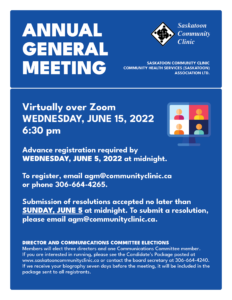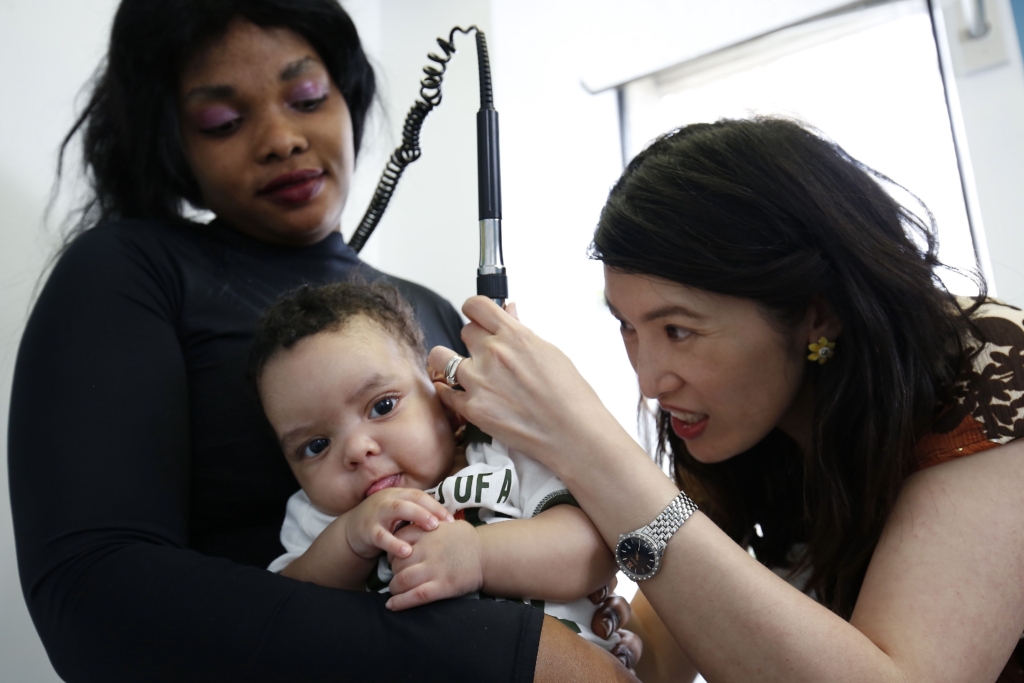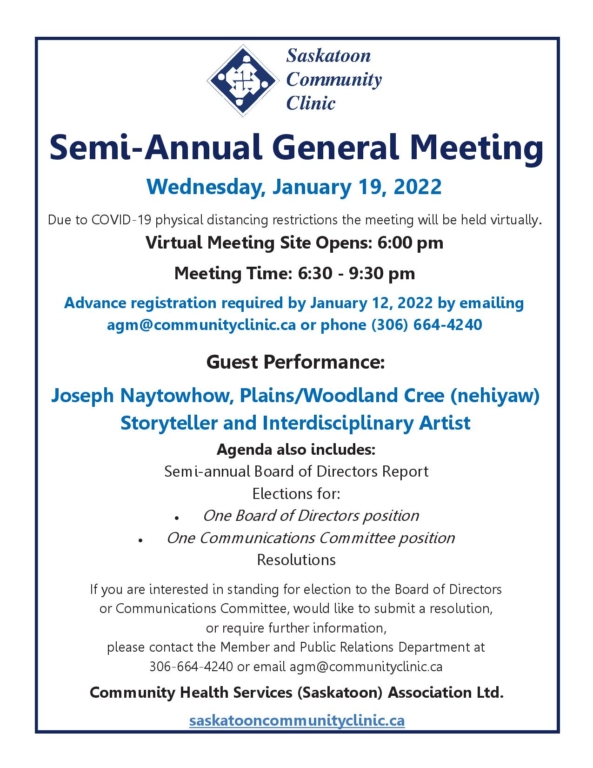Annual General Meeting Package
Please find the meeting package below:
Annual General Meeting 2022 Meeting Package

Please find the meeting package below:
Annual General Meeting 2022 Meeting Package

BOARD OF DIRECTORS AND COMMUNICATIONS COMMITTEE ELECTIONS
Members will elect three board members and one Communications Committee member at the upcoming Annual General Meeting on June 15.
You must be a member of the Community Health Services (Saskatoon) Association to be eligible to run for the Board of Directors. If you are not a member, you must apply by Monday, May 30 at 4:00 p.m. in order to be eligible to stand for election. If you are not a member, please contact our Board Secretary, Hazel Javier, at (306) 664‐4240 or [email protected] who will facilitate your membership being processed and approved.
The information you provide in your application will be used and disclosed for the purposes of Community Health Services (Saskatoon) Association election and post-election purposes. It will be made publicly available as required for these purposes.
The Nominating Committee asks that you review the Candidate’s Package for the position you are interested in and complete the attached forms. All sections of the forms need to be completed for the nomination to be processed.
Interested in running? Click on the candidate package link below:

Photo by Kevin Hogarth, Courtesy of Saskatoon Open Door Society
By Danielle Chartier, Member and Public Relations Director
Fleeing your home as a refugee puts your health at risk, even after you’ve safely arrived in the country that has taken you in.
“Being a refugee, itself, creates risk factors for your health … Any journey where you’re fleeing persecution and violence leads to higher risk of trauma and mental health difficulties,” explains pediatrician Mahli Brindamour.
The Refugee Engagement and Community Health Clinic (REACH), which calls the Saskatoon Community Clinic (SCC) home, does its best to ensure the hundreds of refugees who arrive in Saskatoon every year have the best possible start to their life in this city.
“There’s lots of hope, but we need to provide services in a timely manner. If we support refugees’ basic needs and look after the health needs of the entire family, we know they will be healthy, productive and involved members of our community. That’s what we have seen,” says Brindamour who helped found and still works with REACH.
REACH has been doing this work since 2016 growing into a successful collaboration between many partners: the SCC; Global Gathering Place; Saskatoon Open Door Society; University of Saskatchewan’s Departments of Family Medicine, Pediatrics, Community Health and Epidemiology; the Saskatchewan Health Authority’s Public Health, Primary Health and Mental Health Services; and Tuberculosis Prevention Control (SK).
“REACH was formed in response to the increasing number of refugees arriving in Saskatoon, coupled with the lack of a dedicated, coordinated and centralized health delivery service for this vulnerable and underserved population,” says SCC Executive Director, Lisa Clatney.
It began with SCC adding ad hoc clinics to its roster on evenings and weekends, mostly volunteer-based, after the sudden arrival of a large number of refugees from Syria and has grown into a clinic serving all refugees who arrive in Saskatoon.
“REACH has been able to provide these services because SCC has included it within its normal operations despite not yet being able to secure permanent funding to support it,” explains Clatney.
Currently, SCC hosts REACH clinics about three half-days per week, but the demand far exceeds the resources available. The challenge of limited resources and growing demand is not new. As Brindamour points out, refugees resettle in Saskatoon all the time. We have had larger waves in the past and there will be larger waves to come.
But the vast numbers of those currently fleeing Ukraine help bring the challenges of a lack of resources into sharp focus.
“Our waitlists are already incredibly long. We don’t have the capacity to see everyone as often as they’d like or as often as they need,” says Brindamour.
“If we are going to see Ukrainian refugees, we need more resources – more money, more people on the ground for their healthcare and resettlement needs,” she says.
The SCC has sought permanent funding from the province to better support this work and reduce the strain of the additional patient load and complexity on the clinic. Although these requests have been rejected thus far, Clatney believes the case for the government to support this work is strong.
“REACH has demonstrated its effectiveness in providing high quality care to all refugees resettling to Saskatoon, filling a critical void in our health system. Without REACH, refugees would likely seek care in emergency departments and walk-in clinics. This would be a disservice to them, but would also add to the burden of our emergency services and the strain on our already-stressed healthcare system,” says Clatney.
Emergency department and walk-in clinics are not well-equipped to support refugees. For example, not all providers are versed in trauma-informed care, have experience working with translators, if necessary, or have much knowledge of tropical diseases, explains REACH and SCC physician Jacelyn Hanson.
On top of those challenges, emergency departments and walk-in clinics provide episodic disjointed care which can end up costing more, says Brindamour.
“Even going to a specialized clinic like REACH, it is difficult. Everything takes more time and is more complicated than we expect,” she says.
Hanson says one of the great things about REACH is the collaborative approach to this work. “We work as team with the settlement agencies and with the Saskatchewan Health Authority, but also within the clinic. The MOAs (medical office assistants) do a lot of calling and receiving of calls. They know the patients and know who to reach out to. Nursing provides a lot of help. Pharmacy and the lab are awesome taking time with our patients working with translators.”
Although refugees are incredibly diverse in terms of where they’re coming from and the specific details of their journey and their culture, they do share one thing in common that Brindamour says is important to keep in mind.
“Refugees have no choice. They either leave and flee or die and that’s why they come here.” One way you can support REACH and refugees here is by letting your Member of the Legislative Assembly (MLA) know you want this program to receive permanent funding.
If contacting your MLA is new to you, you can ask the Member and Public Relations Department at [email protected] for assistance.
Have your say!
There are several different ways to participate.
In 2020 the Seniors Advisory Council invited U of S students to join the council as student research volunteers to study the impact of COVID-19 on long-term care. In this new report they reveal long-standing concerns about the health of the long-term care system and make recommendations for change. The Seniors Advisory Council is composed of Clinic members who are older adults and student volunteers who share an interest in improving seniors’ health. Interested in learning more? Contact: [email protected]
Click here to read the report.
Learn more about our SAC student research program on page 6 of the
Please find the meeting package below.
If the document does not appear for you, click the link here:
Meeting Package Semi Annual January 2022
https://saskatooncommunityclinic.ca/wp-content/uploads/2021/10/Meeting-Package-Semi-Annual-January-2022.pdf

The outreach and counselling teams at Westside Community Clinic alongside our community partners do important and impactful work everyday. It’s so good to read a personal account of how one of our Westside team members was able to make a difference in someone’s life. Justine, we are all so proud of you!
In the summer of 2021, Delbert Paintednose carefully propped a box spring atop two pillars cobbled together from scrap and a recycled bed frame. This, in a back alley in west Saskatoon, was the closest thing he had to home.
Paintednose spent three years living in places like this, hopping between alleyways, couches and anywhere else he could find before he finally got a place of his own this fall.
He said his caseworker, Justine, is why he ultimately found a home.
“I played by the rules this whole time, and it took me three years to get a house. I just about gave up … I’m glad I didn’t, and I’m glad I had someone like Justine to support me,” Paintednose said.
Read the article on StarPhoenix: Trapped: How Sask.’s housing gap fuels a cycle of addiction
Elections at the upcoming virtual Semi-annual Members Meeting on January 19, 2022 are for:
You must be a member of the Community Health Services (Saskatoon) Association to be eligible to stand for election. If you are not a member, you must apply for membership by Friday November 19, 2021 in order to be eligible. If you are not a member or to check on your membership status please contact our Board Secretary, Hazel Javier at (306) 664-4240 or [email protected] .
The information you provide in your application will be used and disclosed for the purposes of Community Health Services (Saskatoon) Association election and post-election purposes. It will be made publicly available as required for these purposes.
The Nominating Committee asks that you review the Candidate’s Package for the position you are interested in and complete the attached forms. All sections of the forms need to be completed for the nomination to be processed.
Interested in running? Click on the candidate package link below:
Please note that the Saskatoon Community Clinic is unable to accommodate requests for COVID-19 testing for travel purposes. The Saskatchewan Health Authority provides the following advice for those who require tests for this reason.
Anyone planning a summer vacation, either within the province, within Canada or internationally, should check the Government of Canada’s COVID travel site to understand any travel restrictions and requirements for travel, which may include proof of a negative COVID-19 test and/or proof of vaccination.
Some airlines and travel destinations require tight timelines for testing, with travellers being required to provide proof of a negative COVID-19 PCR test (not a rapid antigen test) within 72 hours of their flight (some airlines and destinations timelines may vary).
While the Saskatchewan Health Authority Laboratory Medicine teams work incredibly hard to provide test results in a timely manner, it can be challenging for the SHA to guarantee PCR test results for asymptomatic travellers in under 72 hours due to transportation and processing times with priority being provided to symptomatic patient care diagnostics.
In Saskatchewan, Quantum Genetix , Haztech and Nobel provide confirmatory COVID-19 PCR testing for asymptomatic individuals. Individuals are responsible for the cost of their own tests.
The SHA encourages travellers to seek out independent testing services for those who require proof of a negative test before taking to the skies, or whichever mode of transport they prefer if they want results provided within a guaranteed timeline.
Saskatchewan residents with a MySaskHealthRecord account can print their COVID-19 immunization records by following the simple instructions available at eHealthSask.ca.
If you do not have a MySaskHealthRecord account, you can sign up today at eHealthSask.ca.
International travel destinations may have specific requirements for their proof of vaccination documentation. eHealth Saskatchewan is currently working with the provincial and federal governments to develop COVID-19 immunization certificates that will be recognized as proof of vaccination status by foreign governments and agencies that require it.